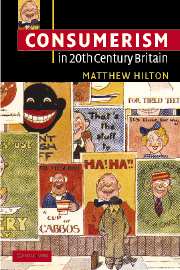Book contents
- Frontmatter
- Contents
- List of illustrations
- Acknowledgements
- List of abbreviations
- Introduction: luxury's shadow
- Part I Necessity
- Part II Affluence
- 6 The new consumer: good housewives and enlightened businessmen
- 7 The professionals: the origins of the organised consumer movement
- 8 Individualism enshrined: the state and the consumer in the 1960s
- 9 The right to shop: consumerism and the economy
- 10 The duty of citizens: consumerism and society
- 11 Affluence or effluence: globalisation and ethical consumerism
- Conclusion: the quantity or the quality of choice
- Bibliography
- Index
10 - The duty of citizens: consumerism and society
Published online by Cambridge University Press: 10 December 2009
- Frontmatter
- Contents
- List of illustrations
- Acknowledgements
- List of abbreviations
- Introduction: luxury's shadow
- Part I Necessity
- Part II Affluence
- 6 The new consumer: good housewives and enlightened businessmen
- 7 The professionals: the origins of the organised consumer movement
- 8 Individualism enshrined: the state and the consumer in the 1960s
- 9 The right to shop: consumerism and the economy
- 10 The duty of citizens: consumerism and society
- 11 Affluence or effluence: globalisation and ethical consumerism
- Conclusion: the quantity or the quality of choice
- Bibliography
- Index
Summary
For Michael Young, consumerism always meant something much more than the choice between competing brands. Indeed, he would have shared the sentiment of one speaker at the third Conference of the International Organisation of Consumers' Unions in 1964 who quoted the German phrase, ‘die Wahl wird zur Qual’ [The choice becomes torment], to highlight the problems facing the affluent shopper. The situation has become an increasingly familiar one, whether it be the sense of mental paralysis felt when confronted by a multitude of identical brands in the supermarket or the more deeper ‘tyranny of choice’ said to emerge from the sense of alienation and ineptness associated with the consuming self in the branded world. But these feelings, according to a long tradition of doubting consumers, are the result, not of a limited choice, but of a limited notion of choice. Should choice be restricted to selecting between goods, or about choosing the ways in which goods are supplied? Is consumerism concerned only with protecting the rights of the individual or does it imply a social duty among empowered consumers to ensure that other individuals share those rights? Is choice concerned solely with the economic act of purchasing or the whole range of social decisions that can go into an individual or group's selection of commodities and services? Where, indeed, is the ideological heart of consumerism: neo-liberal economics or the goals of social democracy and democratic socialism?
- Type
- Chapter
- Information
- Consumerism in Twentieth-Century BritainThe Search for a Historical Movement, pp. 268 - 297Publisher: Cambridge University PressPrint publication year: 2003

